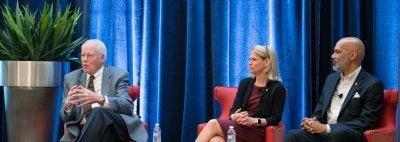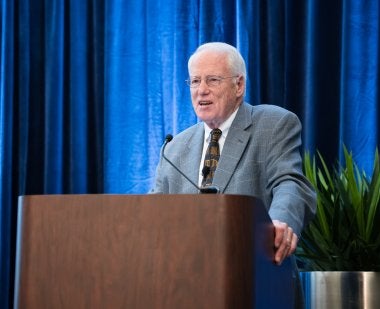

At Dean’s Lecture, Brit Kirwan Presents on Equity and Excellence in Maryland K-12 Education

The College of Education hosted the 2nd annual Dean’s Lecture on Education and Society on April 29, with Chancellor Emeritus of the University System of Maryland William E. “Brit” Kirwan as the invited speaker. The lecture was held near campus at the College Park Marriott Hotel & Conference Center, and was well-attended by faculty, students, alumni and local educators.
Following an introduction and welcome by COE Associate Professor Lawrence M. Clark and Dean Jennifer King Rice, Dr. Kirwan spoke on “Equity and Excellence in Maryland Education.”
“It’s hard to think of anything more important for the advancement of a society than high-quality education,” Dr. Kirwan said to the audience. “Maryland has struggled for decades over the issue of equity in education.”
Dr. Kirwan, chair of the Maryland Commission of Innovation and Excellence in Education, also known as the Kirwan Commission, led the Commission’s study of funding for K-12 education in the State and made recommendations for improvements. Established in 2016, the Commission’s study prompted the legislature to approve an additional $800 million in education funding this spring.
In his presentation, Dr. Kirwan highlighted research from the Commission’s study of Maryland schools. Although Maryland has a reputation for strong schools, he noted some troubling findings, including that Maryland students underperform on learning outcomes, Maryland spends less on low-income students than on wealthy students, that less than 40 percent of graduating high school seniors are considered “college and career ready,” and that nearly half of second-year teachers will not return for a third year.
“To our great dismay, we learned that although we have a lot of very good schools and excellent teachers, we don’t have enough of them,” he said.
The lecture was followed by a Q&A moderated by Drs. Clark and Rice with questions from the audience ranging from teacher preparation and training to providing sabbaticals and fellowships for teachers to continue in their professional development.
“We can continue as we are in making incremental changes and hope that the system we have will make us a little less mediocre, or we can do something really big and bold and set a bright future for not just for our state but for all our children in the state, and I think, maybe be a beacon for the rest of the country to finally get education right,” Dr. Kirwan concluded.
Dr. Kirwan also chairs the Conference Board of the Mathematical Science and is executive director of Transforming Post-Secondary education in Mathematics. He received a bachelor’s degree in mathematics from the University of Kentucky, and master’s and doctoral degrees from Rutgers, The State University of New Jersey.


